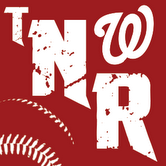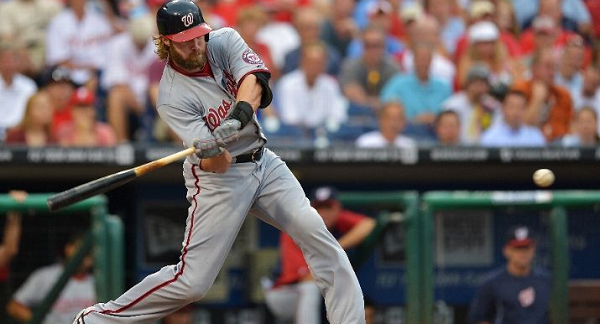In 2013, the Nationals finished 6th in runs scored. I’ve pointed this out a few times, but I remind you of this because it is still a bit hard to believe. The team struggled through much of the season without being able to do just that. They got hot late and scored so many runs in August (4th in the NL) and September (2nd in the NL) that their overall number looks good.
One of the reasons that they performed so poorly was injuries and the lack of a strong bench, something I’ve discussed quite a bit here. But that still doesn’t explain why, even in their good months, they had so many low scoring games. In September, despite finishing #2 in the NL in runs, they had 10 games scoring 3 runs or less. In July, when they finished 6th in runs scored, it was 16. That means they had a ton of high scoring games to go with that.
This comes down to their power, and their on base percentage. The team had really good power (SLG: 4th in the NL), unlike their ability to consistently get on base (OBP: 9th in the NL). The problem with the low OBP guys is that when they aren’t hitting, they don’t contribute anything on offense.
Guys like Ian Desmond and Wilson Ramos are the embodiment of this “more subtle” all or nothing approach. I say more subtle because with all or nothing we think of hulking power hitters who only give you home runs or strikeouts. Desi and Ramos are a little different – they either give you good hitting or bad. It’s a massive oversimplification, but it’s not an inaccurate way to look at it. Other guys, who actually take walks, can contribute much more.
Look at Ramos vs. Bryce Harper. They have almost identical batting averages, yet Harper made it to base safely in about 6% more of his plate appearances. This may not seem like alot, but 6% should be around 40 PAs a year. That another time on base in 1/4 of the Nats games. That’s meaningful.
Another 60 or 80 baserunners over the course of the year would have made a big difference in this team’s results. There would have been fewer of those 0, 1 or 2 run games for sure. And fewer losses. Remember, this is a team that was 68-9 when they scored 4 or more runs. A few more of those games would have helped.
[button url=’#’ size=’small’ style=’blue’] Fixing the Issue [/button]
The best way to fix this issue – keep Bryce Harper and Jayson Werth in the lineup. It’s simplistic, and difficult in practice to achieve. Yet that really is the best solution. Their abilities to get on base keep the offense rolling, even when they’re not hitting great.
Ryan Zimmerman is not a great OBP guy, but he aint bad, and he ranks high on this team. Which gives you an idea of how well they do get on base. But… he is pretty close to Harper and Werth in terms of importance in this regard.
It wouldn’t hurt to get another guy who could get on base, and help keep the team a bit more consistent in that regard. One possibility is at first base. Now, the Nats may very well see Adam LaRoche as just that guy. It’s not hard to imagine that he improves upon a bad 2013. If he does, that will help. But let’s not start thinking too loftily about that. His career .337 OBP isn’t much better than the .332 he has this year.
If they want to add in the OBP category and keep LaRoche, they might do well to get a platoon partner for him, as I’ve suggested. His career .349 OBP vs RHP is drastically higher than his .300 vs. LHP, and a right handed complement at first base would help them take advantage of that without dealing with the .254 OBP vs LHP he had in 2013.
Whatever they decide to do, even if it’s nothing, the most important factors will be Harper and Werth. Losing 250 or so PAs between the two of them in 2013 hurt the team. While they can’t expect to play 162 games, their health, or lack thereof, probably will have more to do with the Nats streaky offense than anything else.

